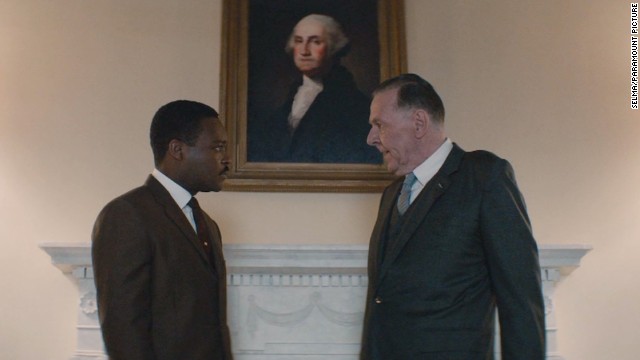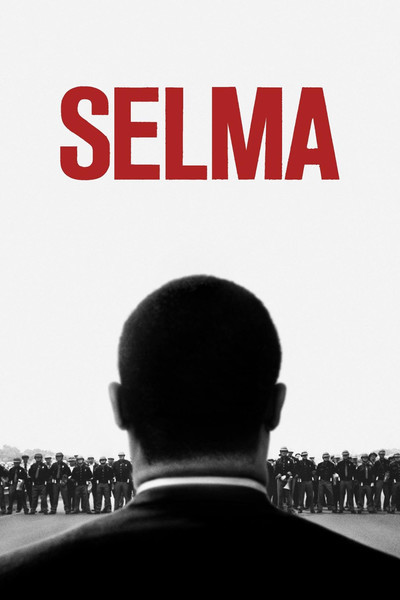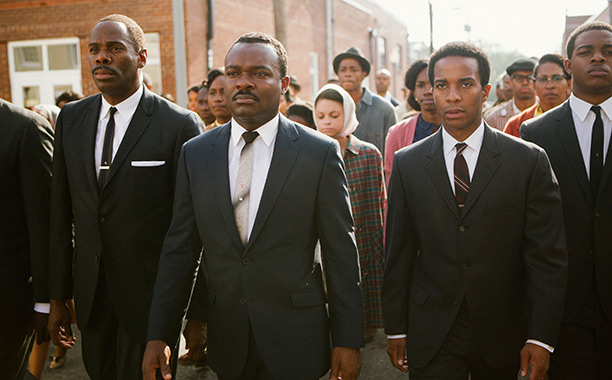In that other major Oscar contending movie now in wide release, director Ava DuVernay goes out of her way to make a mythologized American icon more relatable, and I think she succeeds. Selma is the first major studio film featuring civil rights legend Martin Luther King Jr. as the protagonist, and here he essentially gets his “Lincoln”- a film that selects one of his most celebrated battles as the focus as opposed to the usual “let’s hit all the beats of their life and then they die” approach to historical films. This movie puts King on a legitimate Hero’s Journey.
Much has been made about the portrayal of President Lyndon Johnson, performed (very well, in my opinion) by Tom Wilkinson as overtly antagonistic and skeptical towards King and his activism, a choice made so as not to dilute too much of the spotlight from MLK, from what I can tell. While he’s not happy about the 16 Street Baptist Church tragedy either (recreated in a dark but very effective scene), at the same time he’d like nothing more than for the social strife down South and across the nation to quietly go away so as not to impede his economic plans. However King, if nothing else, isn’t one to quietly wait for a problem to settle down, and he immediately gets to work on a march from Selma, Alabama to Montgomery for the right to vote without impossible restrictions.
There’s no dead weight amongst the cast of Selma, everyone has their working boots on when it comes to recreating the drama and the strife of 1960’s America. Relative unknowns like Stephan James, impressive as a young John Lewis, stand out alongside veterans like Tim Roth who gives us a suitably arrogant and vile George Wallace, as well as Oprah “Queen Of The World” Winfrey playing Annie Lee Cooper, known for decking the sheriff of Selma at the time. (Needless to say, I don’t think a lot of the racist white mobs in this movie cared that much about not getting a car.) Common not only helps perform the main theme of the film, he also plays SCLC director James Bevel, acting like sort of a Greek chorus.

Still, it’s David Oyelowo as King himself who runs away with the show. He most definitely nails down MLK’s nobility and righteous anger, delivering stirring oratories with as much conviction as a real life preacher, yet he also manages to capture his personal strife, loneliness, his faults and even his sense of humor now and then. Heck, at times he can even be a little petty, if his rivalry with Malcom X (Nigel Thatch) is anything to go by. Him and Carmen Ejogo as Coretta Scott King deserve a lot of credit for the scenes in which King’s stories of infidelity are addressed, which do a lot to make Selma a great personal story as it is a topical one.
The real draw of the movie is the ensuing strategic battle between King and his organizers against his political opponents as well as LBJ’s timidness. The dialogue isn’t just full of fluff, there’s actual planning, disagreements and debates among all sides. Our protagonists aren’t made to be angels, a number of protestors find themselves wavering on King’s message of nonviolence- and while Oyelowo as King never deters from that, he still does a great job playing a man with the world on his shoulders. Overall, Selma isn’t just relevant, it’s a legitimately exciting and smart historical drama that’s definitely worth a look.


